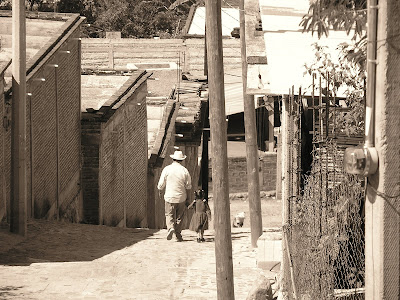The Guelaguetza concluded this past Monday without incident. In fact, the most notable element surrounding the Guelaguetza and all the hype is the absence of news about the event. APPO staged a peaceful march on Monday and if there were any casualties as a result I haven't heard about them. Tuesday's papers made little mention of the situation, as far as I read, either in favor of the government or the Guelaguetza's main opposition, namely APPO and Section XXII of the teachers union. Even after I trawled the Internet for a short time yesterday I didn't find much in the way of commentary worth passing on, a rarity given the controversy and tumult that has plagued Oaxaca on this particular issue. Of course the Guelaguetza and the proposed boycott are ancillary to the larger mission, which is to restore integrity to government, free political prisoners and respect both the specific and the broad human rights of all Oaxacans. (Oxaquenos is the preferred name for people here, but without that little symbol over the "n" it feels hard to get it to read right.)
So what now? That's would be the question on many minds as we near the August 5 statewide elections. Speculation has it (depending of course on which paper you read) that the PRI stranglehold on Oaxacan politics may be near an end. At the same time, conventional wisdom loudly declares that PRI, PAN and even the PRD, positioned as the people's alternative, are each the same as the other. On top of that, the parties hold alliances with one another to deliver blocs of votes during election season. There's a whole lot of smooth politicking in the city (read "greasy palms") and it's hard to get inspired about any of it. The one big factor that hangs in the balance, though, is that if the PRI gets a spanking--or even just a nudge off the podium--then perhaps Governor Ulises Ruiz won't find so much sanctuary in the state and could be forced to answer some uncomfortable questions.
To that end I read in La Jornada yesterday that Irene Khan, secretary general of Amnesty International, is in Oaxaca this week to look into evidence of human rights abuses in Oaxaca last year (and, if AI is paying attention, right now). I especially like this clip from AI's press release on the visit:
16:00 - 17:00 [Tuesday, August 1] -- AI’s delegation will meet with members of the State Cabinet. There will be an opportunity for media interviews after this meeting. Hotel Fiesta Inn, AV Universidad 140, ex Hacienda Candían, Plaza de Bahias
A meeting with Governor Ulises Ruiz is being confirmed.
Journalists are invited to join Amnesty International’s visit to Oaxaca provided they organize their own travel.
Emphasis mine. It should be interesting. Are the journalists invited to join the meeting, too? If AI managed to pressure El Gobernador into a meeting, it could be finishing up as I write this, though I'm not optimistic Governor Ruiz has free time just days before statewide elections to meet with a lowly envoy from Amnesty International. (The Spanish word for sarcasm, I learned this week, is sarcasmo.) As the elections draw near, Nancy Davies makes the strong suggestion that, due to complex bargaining and savvy, pan-American political maneuvering to ensure that the proposed expansion of the Panama Canal goes through, these elections may not be so local after all. I don't know enough about the issue to stamp my approval on the notion and call for more exposure, but it certainly bears consideration. Maybe those of you with a little more information about the Canal project can lend a couple comments?
And that's the news, as I have it, from Oaxaca at the moment. Sorry for the long delay between posts (and I'm thrilled that anyone noticed). Between learning the language, learning the city and surrounding parts, and blogging about it all, blogging gets kicked to the curb more often than not. I sincerely hope to have more soon.
Tags: Oaxaca, Guelaguetza, Governor Ulises Ruiz, Irene Khan, Amnesty International, PRI









